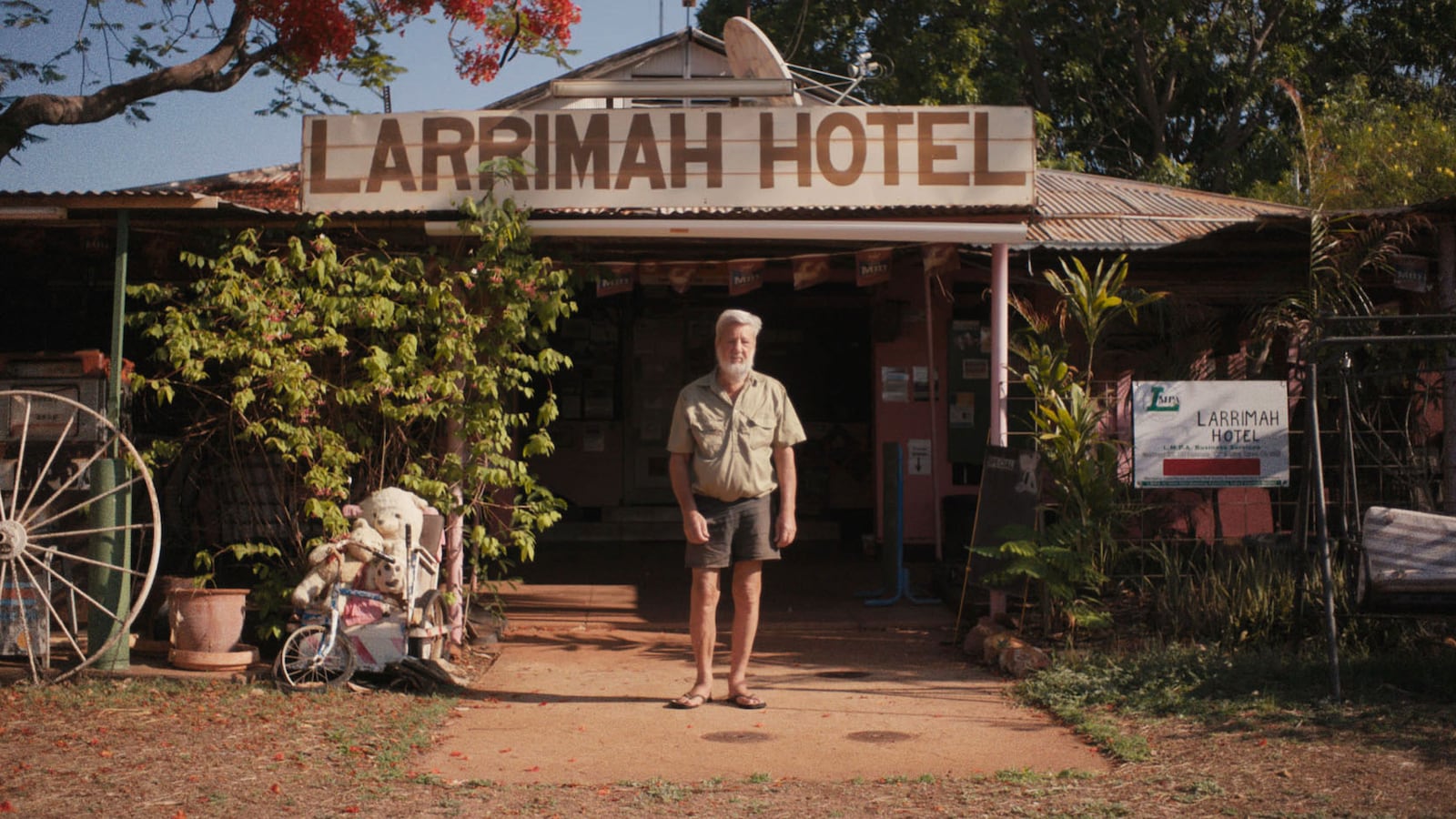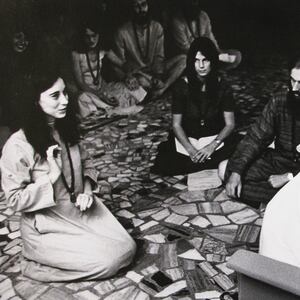If you were looking to move to the literal middle of nowhere, you might very well wind up in Larrimah, a tiny Australian outpost on Stewart Highway in the Northern Territory that, a few years back, boasted a population of 11.
Its ranks decreased by one on Dec. 16, 2017, when long-time resident Paddy Moriarty vanished. It was a turn of events that stoked national curiosity, and it serves as fodder for a captivating whodunit and portrait of fringe life in Last Stop Larrimah, an HBO documentary (Oct. 8)—produced by Jay and Mark Duplass who also produced Netflix’s Wild, Wild Country—about a small town, big feuds, and one extremely mysterious disappearance.
An Irishman who settled in Larrimah after pit stops in other Aussie locales (including one where he apparently had nine children with an Aboriginal woman), Paddy was apparently well-liked in Larrimah. And Thomas Tancred’s film conveys his gregarious straight-talking personality through old interviews with him and other locales that—in a stroke of storytelling luck—were produced years earlier by a TV news station.
Paddy was a regular fixture at Larrimah’s pub, which was the area’s virtual hub considering that it doubled as a hotel, a shop where mail could be picked up, and a bus depot. He was a colorful guy who liked to drink and was good friends with the watering hole’s owner Barry, here referred to as a “publican,” whose claim to fame was giving Steve Irwin’s father Bob his first crocodile (and who kept his own in his backyard).
At least initially, Paddy comes across as a friendly character, cracking whips and talking trash in his trademark hat (worn to hide his baldness). More than one Larrimah resident waxes nostalgic about Paddy, a cattleman who arrived down under in 1966 at the age of 19, and whose laugh could “brighten your day.” Thus, when he went missing on Dec. 16, 2017, it immediately raised a few eyebrows. Nonetheless, no one (including his good buddy Barry, who knew he was MIA) called the police for three days. By the time detective Matt Allen and his team reached the scene, the trail was cool. Still, there were plenty of leads to investigate. Regardless of its cheery exterior as a quaint old-school enclave filled with like-minded loners and recluses, Larrimah was a place roiling with tensions. And as Tancred’s non-fiction inquiry soon elucidates, they didn’t all have to do with Paddy.
Just about everyone who lives in Larrimah participates in Last Stop Larrimah: Barry; newcomers Karen and Mark; first responders Karl and Bobbie; “old man” Lenny; Cookie “the Candy Thief;” Billy “Light Can” (a nickname born from his fondness for light beer); beer can-collecting recluse Dave; bartender Richard; and pie lady Fran, who was famed for her meat pastries and who lived directly across the street from Paddy. Fran and Paddy had—ahem—beef, owing to the fact that Barry’s bar had begun selling meat pies and, when she objected to this encroachment on her business, Paddy had taken Barry’s side and badmouthed her delicacies—and then put up a sign at his house directing visitors to the pub. Fran makes no bones about her distaste for Paddy, and she quickly became a suspect not just to police but to townsfolk, who figured she’d been involved—and even threw around a few Sweeney Todd-esque rumors about how she might have disposed of his body.
Paddy’s body was never found and neither was a murder weapon or physical material that might suggest his whereabouts or fate, leaving investigators to rummage through Larrimah’s dirty laundry in search of clues. What they discovered were plenty of petty squabbles. Fran hated Paddy, as did her gardener Owen, who had big-time problems with Paddy’s dog Kellie (which was similarly gone). Karl and Bobbie were at odds with Barry (and therefore Paddy) over the pub, which had previously been owned by Karl and Bobbie’s daughter Diane—who later ran a tourist complex that burned to the ground under circumstances made suspicious by Paddy’s reputation for arson. Fran didn’t get along with Billy, her ex, whom she threw out of the house and who now lived next door in one of Larrimah’s many dilapidated trailers. Richard too was eventually displaced, getting fired from the pub for excessive drinking and opting, in the wake of this disgrace, to relocate.
Accusations of wrongdoing fly in Last Stop Larrimah, be it insinuations that Paddy was a sexual pest, that Barry (a cop-hating bushman) was a crook, or that Bobbie, Karl and Diane torched their own business for scammy financial gain. Making head or tail of these allegations is next to impossible, and that was also true for police, whose area searches and interrogations inspired a host of tantalizing ideas, but scant way to corroborate them.
Split into five chapters (and a prologue), Tancred’s documentary digs into the minor and major angles of Paddy’s disappearance and, for the most part, unearths little concrete evidence. As such, it can only make an educated guess about what took place on the night in question—until, that is, it drops a bombshell audio recording that sounds an awful lot like a private confession to the crime.
Nonetheless, Last Stop Larrimah falls short of offering a definitive resolution, narratively or legally speaking. In a remote, barren area like Larrimah, where solitary people go about their routines with few prying eyes, getting away with homicide appears to be relatively easy, especially when a culprit is given a three-day head start to cover their tracks. In the absence of conclusive evidence, what’s left is the sort of bitter, slanderous speculation that defined Larrimah when Paddy was alive. That’s made plain by the fact that, to this day, no one has been charged in connection with the man’s death, this despite a $250,000 reward offered to anyone with pertinent information about the case.
Last Stop Larrimah is a tale about provincial dynamics and the hostilities they often breed, as well as about the unique types of men and women who willingly choose to spend their days and nights on the outer edges of civilization. There’s truth in it, even if it’s not necessarily the sort that might lead to a conviction.







